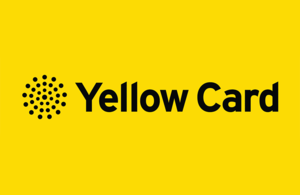Every report counts: support the Yellow Card scheme by reporting suspected side effects
People who suspect they may have experienced a side effect from a medicine or vaccine are being encouraged to report it to the Medicines and Healthcare products Regulatory Agency (MHRA) Yellow Card scheme as part of the global #MedSafetyWeek campaign from 1-7 November 2021.

The social media campaign calls upon healthcare professionals, national immunisation programme staff, as well as patients, their carers and families, to report suspected side effects from medicines or vaccines using the Yellow Card scheme. This #MedSafetyWeek is the sixth annual awareness week involving medicine regulators from over 60 countries. It focuses on the importance of reporting suspected side effects following vaccination and the MHRA is taking part to further encourage everyone to report.
Vaccines are the best way to protect individuals against infectious diseases and have already saved millions of lives. Like all medicines, side effects can happen. Reporting suspected side effects to the Yellow Card scheme helps the MHRA to identify new side effects and gain more information about known effects.
Every report counts, so the advice to everyone is to report any suspected side effect to medicines, vaccines or medical devices as soon as possible. You can show support during #MedSafetyWeek by sharing the MHRA’s posts on social media and discussing with colleagues, friends and family the importance of reporting suspected side effects to the Yellow Card scheme. Healthcare professionals prescribing, dispensing or administering medicines or vaccines are encouraged to discuss side effects with their patients and to be vigilant for new or rare suspected side effects.
Mick Foy, Head of Pharmacovigilance Strategy at the MHRA, says:
The most important part of our work is making sure the vaccines and medicines you and your family take are effective and acceptably safe. This campaign comes at a crucial time when millions of people in the UK are vaccinated against COVID-19 but is equally applicable to all vaccines and medicines.
Yellow Card scheme reports play a key role in helping the MHRA monitor the safe use of all medicines and vaccines to protect public health through effective regulation.
Reporting suspected side effects using the Yellow Card scheme helps ensure vaccines, medicines and medical devices continue to be used in the best way and adds to the known safety information about healthcare products.
Notes to Editor
-
The MHRA, which runs the Yellow Card scheme, is responsible for protecting and improving the health of millions of people every day through the effective regulation of all medicines, vaccines and medical devices in the UK by ensuring they work and are acceptably safe. All our work is underpinned by robust and fact-based judgements to ensure that the benefits justify any risks.
-
Anyone can use the Yellow Card scheme to report suspected side effects of medicines and vaccines, incidents involving medical devices, defective, fake medical products and safety concerns for e-cigarettes or their refill containers (e-liquids). The Yellow Card scheme is an early warning system for detecting patient safety issues and the scheme has identified many new safety issues that were unknown before being reported via a Yellow Card report.
-
Reports can be made on the Yellow Card scheme website, via the app available from the Google Play Store or Apple App Store, via freephone (0800 731 6789, 9am to 5pm Monday to Friday) or by reporting an issue to their healthcare team who can file a report on their behalf. Yellow Card reporting for suspected side effects can also be made from some clinical IT systems for healthcare professionals (EMIS, SystmOne, Vision, MiDatabank and Ulysses).
-
The MHRA is providing a dedicated Coronavirus Yellow Card reporting site to report suspected side effects to medicines, vaccines, medical device and test kit incidents used in coronavirus testing and treatment.
-
Patients are advised to contact a healthcare professional if they are worried about their health.
-
National medicines regulatory authorities from 63 countries across the globe and their stakeholders will be taking part in this international campaign led by Uppsala Monitoring Centre (UMC), the World Health Organisation (WHO) Collaborating Centre for International Drug Monitoring. The campaign is supported by members of the Heads of Medicines Agencies (HMA) and the International Coalition of Medicines Regulatory Authorities (ICMRA). The #MedSafetyWeek 2021 project team consists of representatives from the following organisations working collaboratively: Medicines and Healthcare products Regulatory Agency (UK) as co-lead, Egypt Chapter of the International Society of Pharmacovigilance (ISoP Egypt), the Health Products Regulatory Authority (Ireland) and the Food and Drugs Authority (Ghana).
Media enquiries
News centre
MHRA
10 South Colonnade
London
E14 4PU
Email newscentre@mhra.gov.uk
During office hours: 020 3080 7651 (08:30 - 17:00)
Out of office hours: 07770 446 189 (17:00 - 08:30)
Office hours are Monday to Friday, 8:30am to 5pm. For real-time updates including the latest press releases and news statements, see our Twitter channel at https://www.twitter.com/mhragovuk.